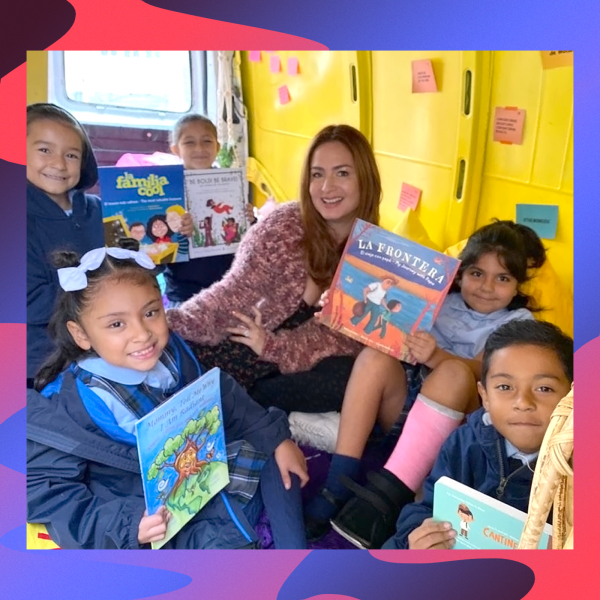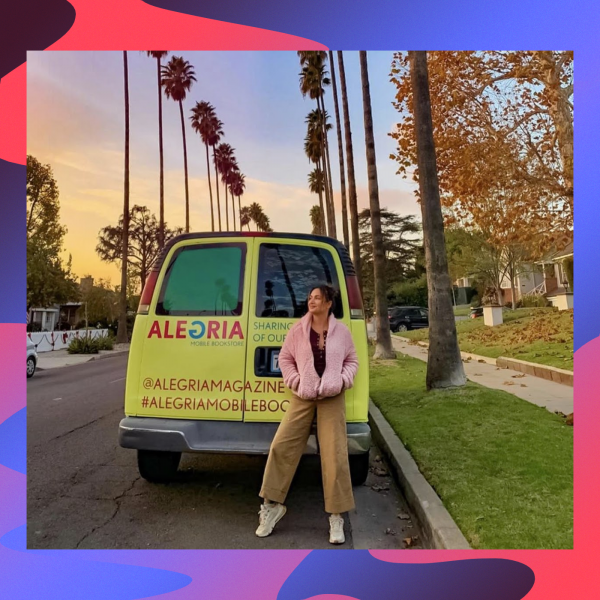Pre-pandemic, an old yellow van drove through Los Angeles communities in Echo Park, Boyle Heights and Hawthorne. Inside, Colombian motorist Davina A. Ferreira, the founder and CEO of Alegria Bilingual Media, invited youth of color to take a look at the four-wheeled bookstore she created. Children and teens alike flipped through the pages of bilingual kids literature and classics by Latine and African-American authors like Gabriel García Márquez and Maya Angelou respectively. Oftentimes, she sent some titles home with kids for free.
“The way we tell stories to ourselves has the potential to change our lives,” Ferreira, 40, tells Remezcla. “There’s power in storytelling. We can see ourselves as victims or sheroes.”
Inspiring the Latine community through prose and poetry is the reason she started Alegria Bilingual Media in 2012. The project began with the high-quality glossy Alegria Magazine, which covers culture, art and entertainment. Unlike other Latin publications printing at the time, the magazine favored inspiring human-interest stories over salacious tabloid content. With the periodical, which still prints twice a year, Ferreira continues to share the joy, beauty, culture and talent of our communities. But she craved more. Seeking interpersonal moments with people in real life, she had the unconventional idea of bringing Latino stories to Latines via a vintage van.
The way we tell stories to ourselves has the potential to change our lives.
The Miami-born, Medellín-raised entrepreneur and poet had plans to take her bookstore-on-wheels cross-country in 2020, hoping to also host creative writing workshops for youth, but was interrupted by the COVID-19 pandemic. With stay-at-home orders in place, she was forced to park her big yellow van and open a digital bookshop. Longing for interaction with her community, Ferreira turned to social media. On Instagram, she started a poetry contest. She anticipated about 10 entries. Instead, more than 150 writers submitted works. The small-scale competition she launched to overcome pandemic ennui grew into The Latinx Poetry Project, a poetic anthology featuring pieces from more than 45 emerging Latine poets, covering themes of immigration, social justice and feminism.

With the publication’s success, Ferreira focused her attention on a lifelong dream she thought was impossible to achieve: establishing her own book publishing house. Since the spring of 2020, Alegria Bilingual Media has published several titles in English and Spanish. All She Is by Cynthia J. Villa, for example, is a collection of reflective bilingual poetry about healing from all of what couldn’t be. Déjame contarte lo que dice el corazón by Paloma Alcantar, on the other hand, delivers poetic notes to readers to help them break apart and gain deeper clarity in their lives. Meanwhile, Mujer de Color(es): A Poetic Experience by Alejandra Jimenez includes poems, essays, prayers and portraits that inspire women of color to reclaim their feminism, strengths and conquer their fears.
While Ferreira moved to California from Colombia in 1998, when she was just 18 years old, to become an actress, she always knew that literature was her first and deepest love, a refuge even. However, like many, life’s demands forced her to abandon a passion she thought couldn’t possibly be sustainable. “When you get to the U.S., you have to make a living and work. You get lost in needing to be successful [and] helping family and you forget that passion, but life takes you back to it,” Ferreira says.

After graduating with a degree in theater, she had a stint in acting that left her disillusioned with the industry and a career in entertainment journalism that always kept her longing for more. Now the businesswoman feels like her life has finally come full circle with Alegria Bilingual Media—and she wants the rest of her community to similarly benefit from the power of literature.
“I grew up in Medellín in the 1990s. These were incredibly violent times,” she recalls. “My parents were dealing with addiction, and books and writing became my safe haven… If you talk to my mom, she’d tell you that I was the kid who locked themselves up in their room after school, reading classics. Books, for me, was where and how I escaped. They were my happy place.”
By providing publishing opportunities to emerging Latine writers, teaching young people about the power of creative writing and ensuring that generations, new and old, know about the classic literary works of Latin America and Latine U.S.A, she hopes Latine storytelling can be a healthy sanctuary for those in the community in need of a safe haven as well.







